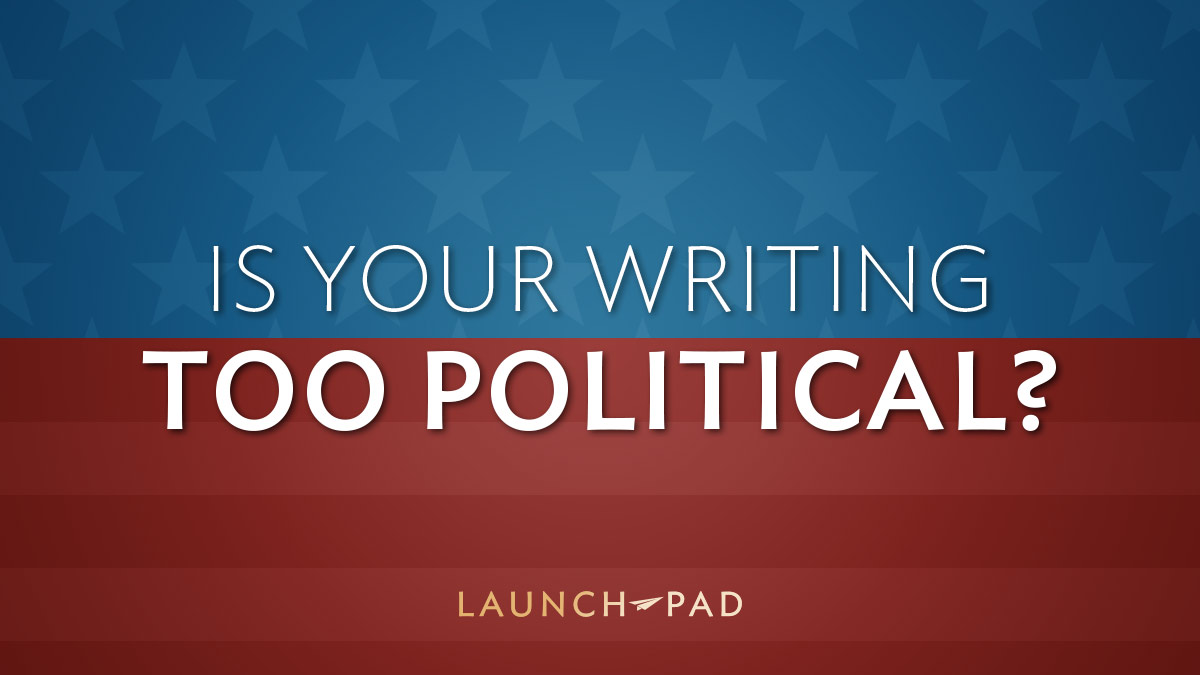
For years, awards winners have been going on stage and stating their political beliefs and met with a slew of criticism. It’s odd that people are annoyed by this, considering Hollywood has never felt the need to hold back on political stories and they often find their stories in politics.
Lately, this conversation has come up again as the dialogue between media, public conversation, and politics has grown louder and more combative in a world where any opinion can be launched to countless recipients in seconds via social media. Film and television have often waded into the conversation and there appears to be a growing demand for political content.
Should you jump into the fire with your next script? It’s not a bad idea when you consider that there’s usually a political true story nominated every year at the Oscars, dark political satires tend to have long-standing appeal, and television offers the opportunity for nuanced discussions of big issues. But as you’re writing your next big script to win Hollywood over with, there are a few things to consider…
Political Settings
The first thing to look at in your script is if it has a political setting, political themes, or both. At the very least, most political-set projects are either calling out government corruption or calling for unity and idealism. I would argue that’s not the stuff that gets called “too political”. Things that people get worked up about are commentary on specific policy.
If you watch the pilot episode of PARKS & RECREATION or VEEP, you know the show is set within a political building, but it arguably doesn’t get into political commentary right away. Even HOUSE OF CARDS is focused more on criticizing the government than it is on policy. That’s a political setting. On the other hand, MRS. AMERICA, which debuted on FX/Hulu in 2020 to raves, is clearly political and shows stories both inside and outside the government. So that would be a project where it’s commenting on policy and the politics of the time.
The same goes for film. Aaron Sorkin (who is one of the most successful political screenwriters) wrote both THE AMERICAN PRESIDENT and A FEW GOOD MEN. The former is more focused on the “everyman” archetype that Michael Douglas is playing and the romantic comedy situation he finds himself in, rather than making a statement about the politics of the 1990s. However, in the latter film (and the original play), there is a clear political bent and military criticism fed through the digestible charisma of Tom Cruise’s pre-MISSION: IMPOSSIBLE era go-to role of “cocky playboy with daddy issues”.
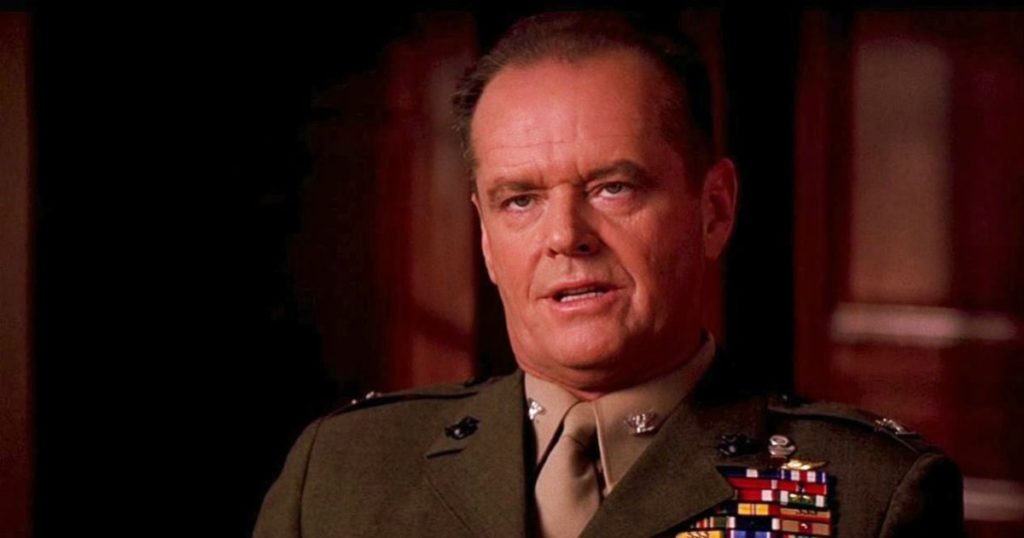
‘A Few Good Men’ (Columbia Pictures)
If you’re simply using the setting, it will be difficult to avoid the political themes entirely because I would argue that everything is political (we’ll get to that later). However, a lot of times in film, you’ll see a story that’s set in the White House or around an election, that is ultimately about unity or general political corruption, and avoids the tougher topics. Think DAVE, SWING VOTE, MR. SMITH GOES TO WASHINGTON… they might use real political issues for a scene or exposition, but they’re not pushing the conversation surrounding them or using them as themes.
Hugh Grant’s storyline in LOVE, ACTUALLY falls into this category. Every scene with him as prime minister talks about a bigger relationship with the United States however, there is nothing specific or substantial politically in any of these moments.
These kinds of stories shouldn’t be dismissed simply because they’re focused more on the emotional journey! The more specific you are in your criticisms or message, the more you risk dating yourself. THE DAILY SHOW is a long-running series that does political skewering at the highest level, however it’s not necessarily re-watchable over time. It’s funny because it’s happening in real-time. Which brings us to…
Political Satires
There are a lot of great films and television shows that are overtly political. WAG THE DOG, BULWORTH, DR. STRANGELOVE, SORRY TO BOTH YOU, and ELECTION are all dark comedies that use a unique way into searing political commentary. They don’t always find their audience upon initial release, but if they’re good, they will eventually.
A great example of this is IDIOCRACY, directed and co-written by Mike Judge, which was released in 2006 taking in less than half a million but has since grown a major cult following. The film was billed as an over-the-top comedy with a ridiculous premise (an American soldier in a hibernation experiment is frozen too long and wakes up 500 years later in a dystopian world). What seemed ridiculous when it came out is now viewed as prophetic as the film depicted a TV personality president, commercialism run amok, and a society that rejects intelligence. Judge and co-writer, Ethan Cohen, are calling out a lot of political trends. The more commentary, the crazier the scenario to balance it out. If those themes were simply presented as speeches, no one would want to watch it. They get away with it by infusing how they feel about the chaos in 2006 into the insanity the audience sees happening 500 years later.
There are films in this category that don’t make the impact they’re hoping for. OUT BRAND IS CRISIS and AMERICAN DREAMZ both seemed like they should’ve hit, but failed to grab audience attention. This could come down to timing, if audiences simply weren’t in a cynical mood, or if the criticism wasn’t clear enough.
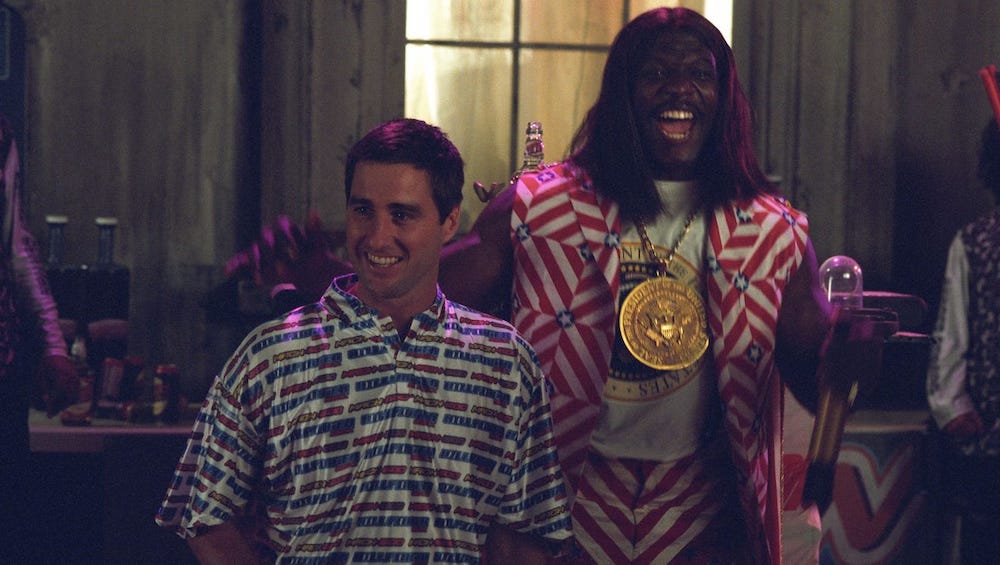
‘Idiocracy’ (20th Century Fox)
Political True Stories
Audiences are typically more willing to go to political stories that are based on a true story. You may view this as exploitative, as many people already have an emotional connection that makes it easier for your script to tap into. Others may cry “too soon” when a film comes from a real political event. If you’re worried that you might be picking something that is too soon, just remember ALL THE PRESIDENT’S MEN was based on the Watergate scandal that occurred from 1971-1974. The book covering the events came out in 1974 and the film came out in 1976. Not as fast as what’s happening with the “GameStop” projects, but pretty fast in an era before instantaneous news. It’s not new to rapidly-produce true story adaptations and you shouldn’t be afraid of it.
The question with any political story, but particularly one based on a true story is: what is the purpose in telling the story? A lot of times with the true story, people already know the events. Look at AMERICAN CRIME STORY: THE PEOPLE VS. OJ. All of America watched that case unfold in real-time when it happened, therefore the audience watching the adaptation would have that emotional connection to tap into. The show wasn’t actually giving any new information. What they did do was reframe the story so you could see the sexism and racism from a 21st-century perspective. That reframing was the reason they felt it was important to tell the story.
With the dark comedies, they’re attacking something bigger. For example, Election drops a lot of the allegory from the book it’s based on to focus on the loss of innocence and corruption at every level of government. WAG THE DOG delves into how the government uses the media for propaganda and asks where the moral line is, or if there even is one.
True stories are also awards season mainstays. There’s a reason they fill up the annual spec lists, like The Blacklist, and are scooped up by actors looking for great performance pieces. The performer can immerse themselves in nuance since the audience already knows the broad strokes. The trick is not to preach.
When Aaron Sorkin won audiences over with WEST WING, it wasn’t based on a true story and he was able to use his charismatic writing style to present idealistic views that people didn’t mind listening to. When he did THE NEWSROOM, he won raves initially, but the fact that the premise followed real news stories of the past made it hard to root for everyone. It’s a bit easier to say what journalists should have done, and show how “easy” that is with fictional journalists that audiences aren’t connected to, when you know the outcome.
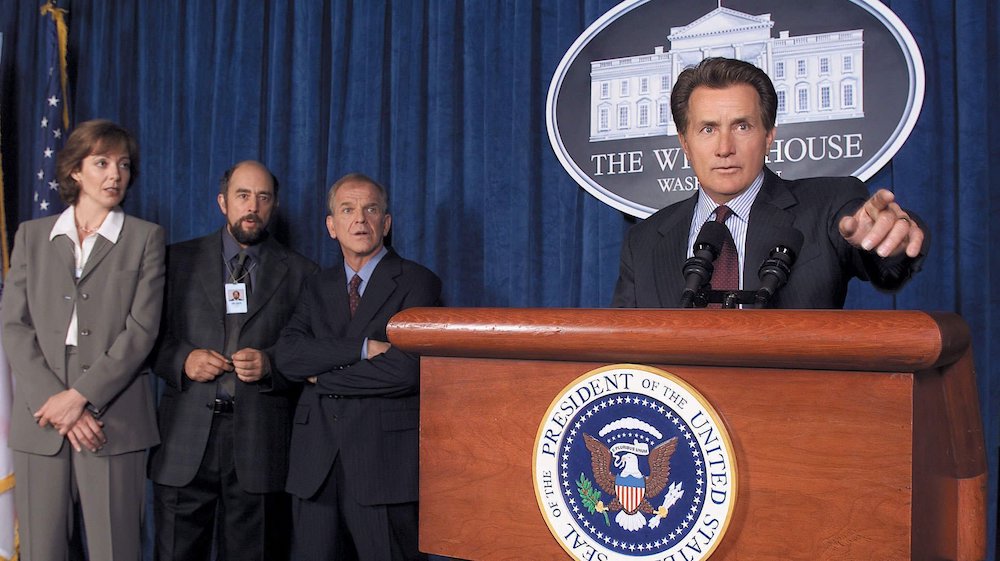
‘The West Wing’ (Warner Bros. Television)
The Emotional Journey
When discussing the evolution of PARKS & RECREATION, creator Michael Schur noted that how people viewed Amy Poehler’s character was different than what they had intended. By allowing her to be someone who unites through passion, instead of someone people are annoyed by their intensity, she became more fun to root for and the political messages she represented were more digestible. She still has an overall emotional journey that is tied to her career, but by making you laugh and root for Leslie, the audience is more to listen to what she has to say. There was no such thing as “too political” for that show because they were able to maintain that balance.
Sorkin uses charisma and physical “clutzy” moments in his writing to make the audience enjoy his characters and more likely to listen to them. The character Sloan Sabbath (Olivia Munn) on THE NEWSROOM was often called out as the smartest person in the room but also teased for missing social cues that created humorous moments. The show-within-a-show’s producer, Mac (Emily Mortimer), outright tells Sloan that she’s giving her five minutes on-air teaching economics because she has great legs. Even the characters within the show know that there’s a line for how much preaching a show can do if there’s not something subconsciously winning them over simultaneously.
Understand the era we’re in
In her Masterclass on screenwriting, acclaimed writer and producer Shonda Rhimes discusses the need to be aware of what is happening in contemporary society in how you’re approaching your ideas.
“The only reason I felt comfortable telling [SCANDAL], and I knew that people could enjoy watching that story was because we were in the midst of the sort of glow of ‘yes we can!’ Obama White House. It was a very hopeful, cheerful, optimistic time in Washington … The same way WEST WING happened when things were a little bit darker and people felt pessimistic about the world and WEST WING is an incredibly optimistic show.
We’re currently in a very divisive time, so how does that impact the story you’re trying to tell and who you’re trying to tell it to?
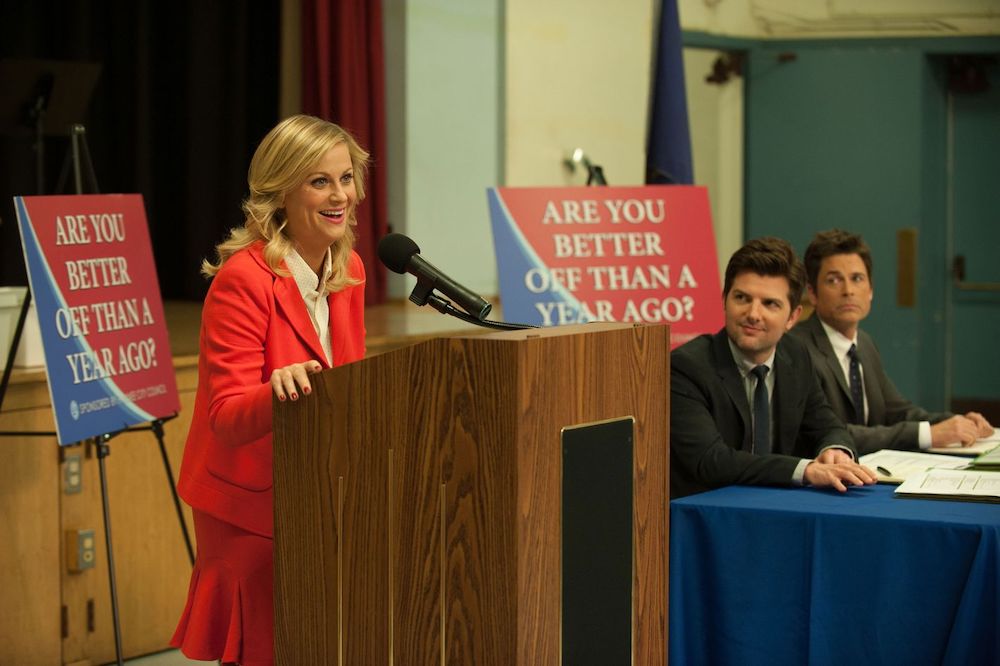
‘Parks and Recreation’ (NBC)
Everything is political
One thing that is often left out of the conversation about politics is that everything is arguably political. Remember that episode of THE GOOD PLACE where Maya Rudolph, as The Judge, goes to earth? She quickly realizes she can’t even do something as simple as buying a tomato without it doing damage to the universe because of the ripple of ramifications. Like who she’s buying the tomato from, the corporation that grew the tomato, the chemicals destroying the planet used on the tomato, etc. This is as true in life as it is in your script, and after everything that has happened in the last couple of years (but particularly 2020), writers can no longer bury their heads in the sand.
What this means is you are making a “political” choice when you decide the gender, race, or sexuality of a character, whether or not you realize it. Because if you pick “female” and it’s well-received, it will likely be categorized as a “feminist story” immediately. Should gender, race, or sexuality be political? No. But as long as rights are being denied to some and not others by the government, they are.
The show JANE THE VIRGIN was very aware of this. The simple idea of the show, a woman in her 20’s, who has never had sex, learns that she’s pregnant (via accidental artificial insemination). Jane (played by Gina Rodriguez) is Latina, raised in a Catholic household, and the granddaughter of an illegal immigrant. These might sound like little pieces of information you don’t have to use, but the show threaded in the larger ramifications of this information as it went on. The later seasons in particular used more overt political storylines revolving around the grandmother. If it were a film, they may not have felt the need to be this overt since there is less time available, but the demographics could still be hailed as a “political choice” by viewers and critics.
Fairly recently in film, Rian Johnson showed how stealthy you can be with your commentary with the hit film KNIVES OUT. The opening shots of the film show a myriad of artifacts that Harlan (Christopher Plummer) has garnered over the years to inspire his mystery novels, however his family is made up of rich white people fighting over the inheritance after his death. The fact that his nurse (Ana de Armas) is an immigrant and even the most progressive family members turn against her, is not even a little bit subtle. The thriller and mystery ride make the commentary palatable, but Johnson is not being coy with how he feels about our society’s racism.
I’m not arguing whether or not this is good or bad, simply that this is the world you are living in as a writer, and if you want to be in control of how your work is received you better think about the purpose of every choice you make no matter what you’re writing. This can aggravate some people, yet when you’re writing, there already shouldn’t be anything on the page that isn’t earned. For example, if you’re writing something you’re producing yourself then you’re not putting anything on the page you can’t afford. The same is true for the theme, the visuals, the demographics depicted, etc.
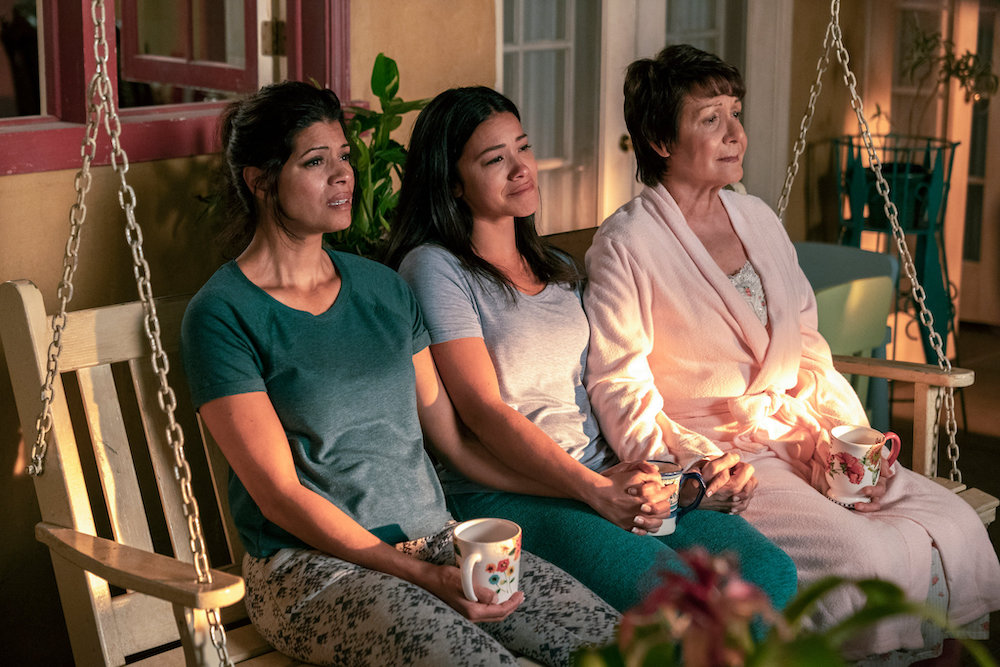
‘Jane the Virgin’ (CBS)
Assume it will be seen as political
The original STAR WARS films have been coming up a lot online lately in political conversations. The story is meant to be universal and depicts heroes that can be slotted in as mascots for all kinds of arguments. Those films are meant to be moral tales for kids, that was always George Lucas’s intention. However, they came out at a time when people were mistrustful of the government in a post-Nixon era and nostalgic for the days when America was viewed as the heroes in WWII.
There is little public discussion of Lucas’s personal politics or if he was trying to make a political argument in that film. And now, whether Lucas likes it or not, those films are being used on both sides of the political aisle. If you don’t want this to happen to your script, you need to find a way to make your message clear without speaking down to your audience.
Is your script too political?
Ultimately, whether or not something is “too political” depends on who you’re talking to and why. If you’re writing something that preaches to the choir, you limit yourself to the choir. If you’re trying to inform people about a true event, you only get the people who care about or are interested in the event. If you want to write something that will make people feel good, then you will get people who are in the mood for that but also probably agree with you already.
If you want to push the conversation, show something new, you have to be stealthy.
There is a hunger for political content right now. Finding something that will somehow reach across the aisle without being manipulated is very difficult but needed. Don’t dive into that conversation if you don’t know exactly what message you’re trying to convey and to whom.
The more overt and repetitive, the more you’re going to be preaching to the choir. If your goal is to expose or get through to a wider audience, you’re going to have to be unique to get people to want to watch it and incredibly clever to win them over. People don’t want to feel talked down to (Newsroom) and more heartwarming films tend to water things down and simply add to the mistrust of government. So whatever route you’re taking, just make sure that your message is getting across through the emotional journey and not merely big speeches.

